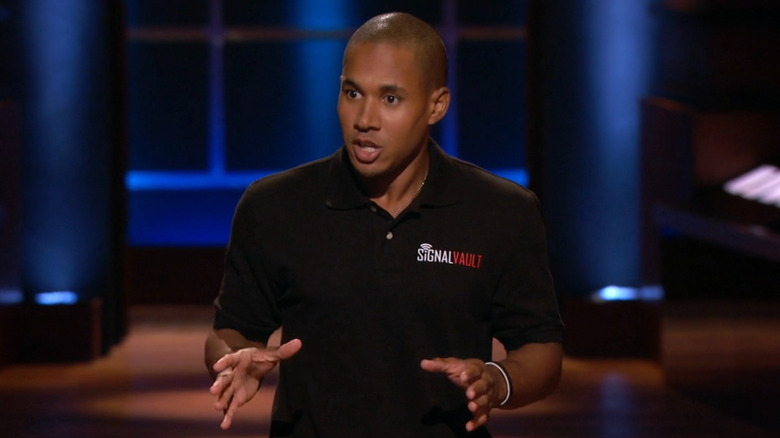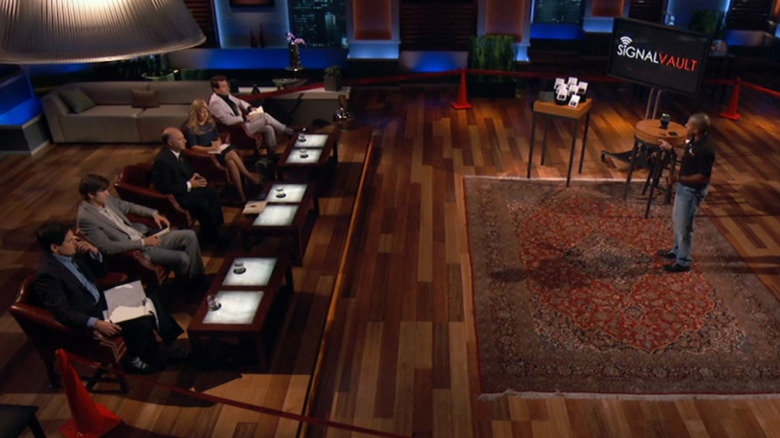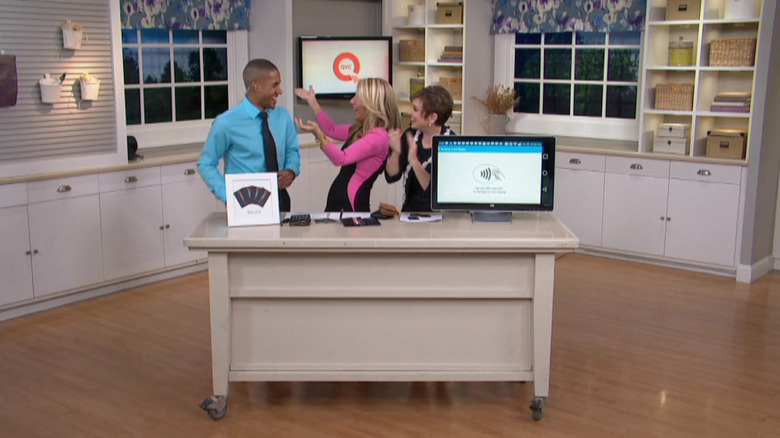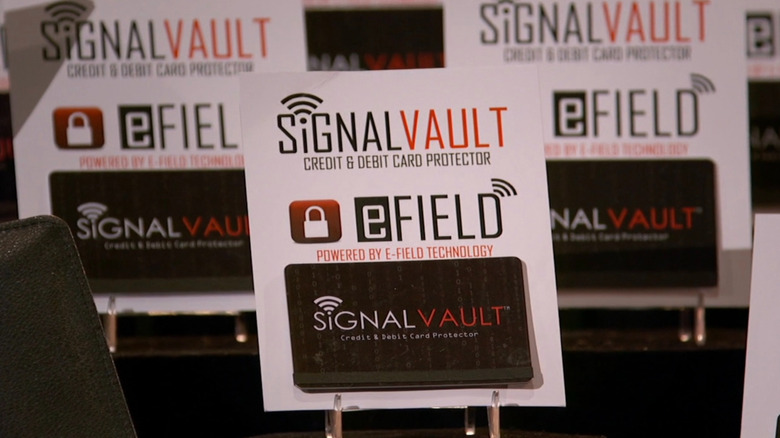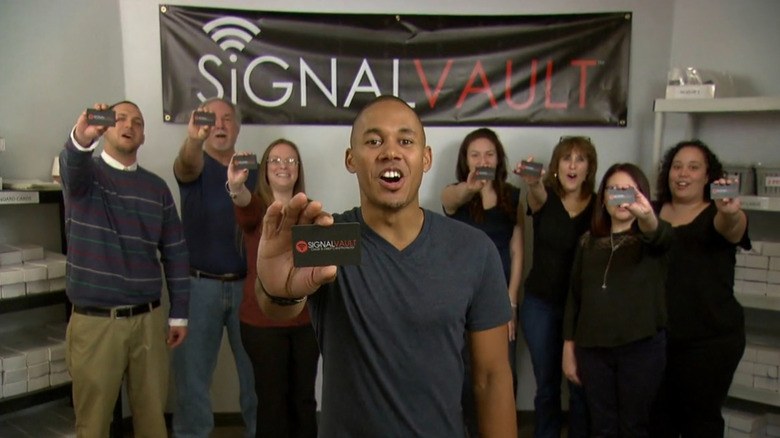What Happened To SignalVault From Shark Tank Season 7?
It's easy to underestimate just how effortlessly criminals can swipe your information. One of the many hacking myths you need to stop believing is that hackers require elaborate equipment setups to do their dirty work. "Shark Tank" contestant Chris Gilpin not only showed just how little effort can go into such malicious acts, but also brought along a solution to the problem with his handy debit-credit protector SignalVault.
SignalVault is a device made to fit in your wallet alongside your credit cards. When placed next to your cards, it acts as a blockade from electronic pickpockets who could otherwise scan the pocket your wallet is in with an unassuming device or phone and gain your credit card information. Gilpin's interest in this category was piqued after seeing an electronic pickpocketing presentation at a 2012 conference. After the aluminum wallet designed to protect him from such attacks broke, he decided to move forward with his own solution. As explained in his "Shark Tank" appearance, Gilpin ran into extraordinary luck when the lottery ticket he purchased for $1 won him $8,000, which he used to officially launch the company.
Gilpin would make his "Shark Tank" debut on Season 7, the same as other security-related pitches such as the password protector Spliikity and the swift emergency contact app EmergenSee. But in contrast to the less-than-stellar ends these pitches met in the tank, SignalVault was largely loved by the Sharks and even generated somewhat of a frenzy among the investors who wanted in.
What happened to SignalVault on Shark Tank?
Chris Gilpin aimed to get $200k for 12.5% of SignalVault from "Shark Tank." To demonstrate his product's capability, he presented how easily hackers could steal someone's information by scanning a wallet and pulling up fake Mark Cuban information. After placing the SignalVault into the wallet, however, the screen showed "No Date Found."
Having operated for a little over a year at this point, Gilpin had sold 45,000 units and made over $300,000, most of which came from online sales. Each unit went for $14.95 and costs only $0.75 to produce, a fact that particularly excited guest Shark Ashton Kutcher. Gilpin informed the Sharks of the severity of the issue at hand, with $8 billion in losses annually in the United States from card fraud, with the country being responsible for half of such malicious attacks. He shared that SignalVault's biggest competitor was ID Stronghold, which Gilpin estimated controlled 80% of the total market.
Mark Cuban and Ashton Kutcher both went out, with both similarly seeing too many challenges ahead for the company in terms of competition and necessary resources. Kevin O'Leary felt that he could give SignalVault credibility by partnering it with his financial networks, but sought 20%. Lori Greiner saw its money-making potential on QVC while Robert Herjavec believed it would pair well with his cybersecurity firm, with each Shark seeking 15%. Wanting Greiner and Herjevec together, Gilpin asked for $250,000 at 18%, which they refused. He then countered at $200,000 for 25%, which they agreed with.
SignalVault after Shark Tank
Leading up to SignalVault's "Shark Tank" debut, a malicious attempt was made, not towards a credit card, but towards the company's reputation. The day before the "Shark Tank" episode aired, ID StrongHold, which Chris Gilpin described on the show as their biggest competitor, put out a video demonstrating how ineffective SignalVault's product was compared to their own. Thankfully, the defamatory piece did little to halt SignalVault's momentum in the long run.
Following the episode's airing on September 25, 2015, SignalVault saw sales skyrocket. Speaking with The Daytona Beach News-Journal in 2016, Gilpin revealed SignalVault did more sales after "Shark Tank" than it had in the previous two years, leading to him hiring employees and leasing office space after previously working by himself out of his home.
Gilpin reappeared on "Shark Tank" Season 7 Episode 18 — the same episode as the eventual hit workout app Sworkit — for an update segment, where he shared that the product sold out in less than ten minutes on QVC. Lori Greiner also proved instrumental in closing big deals with retailers such as Bed Bath & Beyond and Staples. Meanwhile, Robert Herjavec got SignalVault further publicity on "Good Morning America" while aiding in search engine optimization and strengthening the overall site for sales influxes. Four months after appearing on "Shark Tank," the company was bringing in $2 million, which increased to $3.2 million after 14 months.
Is SignalVault still in business?
As of this writing, SignalVault is still up and running. The vast majority of its product line can be purchased on its website. Each SignalVault protector comes as a 2-pack, as the company recommends that certain wallets, such as traditional women's wallets, be equipped with two cards due to their unique shape. Each comes with a three-year warranty, which is typically how long the card is expected to last. There are also options to include customized logos on your SignalVault card or to purchase cheaper ones with the logos of one of SignalVault's business partners.
Along with its namesake product, the company has also come out with a number of additional tech products and accessories. These include the TravelVault, a slim wallet imbued with the same protective capabilities as the SignalVault, and the KeyGuard Smart Key and Protector that keeps smart keys safe from having their signals picked up by criminals. The company even carries a security camera made for the outdoors, complete with water resistance, motion detection, and night vision.
If you're thinking of trying a SignalVault for yourself, you'll be glad to know that it sports largely positive reviews. On Amazon, the product sports a 4.5 out of 5-star rating average from almost 1,000 buyers. Despite some mixed reactions on the thickness and registration process, most found it to be convenient and effective.
What's next for SignalVault?
There's no denying that the work that Chris Gilpin, his "Shark Tank" investors, and the rest of his team put into SignalVault has been paying off. The simplicity of the product and its essential function continue to make it a favorite among "Shark Tank" fans to this day. However, in the rapidly evolving world of tech, it can be hard to stay on top of the competition. This, combined with the increasingly nuanced techniques of hackers, means that SignalVault will have to push for innovation if it hopes to stay relevant in the far future, especially as other capable RFID blocking wallets become more readily available.
As of late, the company has more or less been on the same wavelength. It hasn't been all that active on social media, having not uploaded to its Facebook since 2022 and its Instagram having been silent since 2018. While its selection of smart devices is certainly nice, it would be great to see the company implement some stronger tech into its namesake product or come out with tools for those who use smartphones for their payments. Sadly, with little to no updates on SignalVault's status as of late, it's hard for consumers to gauge how up-to-date the company is with the more sophisticated trends of modern-day hackers. Hopefully, Gilpin's team has simply hit some minor road bumps and is taking the time to surprise users with their next innovation.
